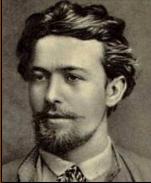Anton Chekhov

Anton Chekhov (1860-1904), Russian physician, renowned short story author and playwright wrote Uncle Vanya (1899);
Often ambiguous, at times humorous, gritty, haunting, ironic, anecdotal, facetious, lyrical, apathetic, bizarre, passionate and tragic, Chekhov's works explore the entire range of the human spirit. Through his use of such Chekhovian elements as subjective observation, stream of consciousness, character epiphanies, and juxtapositions of pessimism and humour we are immersed in the lives of Chekhov's complex characters. He spurned the more traditional story as moral lesson found in the style of Fyodor Dostoevsky. He wanted his works to ask the reader questions, not to provide answers. While he started out with more comedic sketches and doggerel published under pseudonyms such as Antosha Chekhonte, Chekov went on to write dozens of stories, many critically acclaimed as fine exemplars of the craft and still studied today. His autobiographical journey as seen through the eyes of a child "The Steppe" earned him the Pushkin Prize in 1888. His works have inspired countless contemporary authors and playwrights including George Bernard Shaw, James Joyce, Raymond Carver, Ernest Hemingway, and Virginia Woolf. Chekhov's plays are said to be second only to those of William Shakespeare in stage popularity.
| Books | Author |
|---|---|
| A Dreary Story | Anton Chekhov |
| The Wife | Anton Chekhov |
| A Tragedian In Spite Of Himself | Anton Chekhov |
| Ivanoff | Anton Chekhov |
| On The High Road | Anton Chekhov |
| The Anniversary | Anton Chekhov |
| The Boor | Anton Chekhov |
| The Cherry Orchard | Anton Chekhov |
| The Proposal | Anton Chekhov |
| The Sea-Gull | Anton Chekhov |
| The Three Sisters | Anton Chekhov |
| The Wedding | Anton Chekhov |
| Uncle Vanya | Anton Chekhov |
- Zinotchka
- Who Was To Blame?
- Whitebrow
- Ward No. 6
- Volodya
- Verotchka
- Vanka
- Uprooted
- Typhus
- Too Early
- Three Years
- The Witch
- The Wife
- The Two Volodyas
- The Trousseau
- The Teacher Of Literature
- The Swedish Match
- The Student
- The Steppe
- The Shoemaker And The Devil
- The Schoolmistress
- The Schoolmaster
- The Runaway
- The Requiem
- The Privy Councillor
- The Princess
- The Post
- The Pipe
- The Petchenyeg
- The Party
- The Orator
- The New Villa
- The Murder
- The Marshal's Widow
- The Man In A Case
- The Lottery Ticket
- The Looking-glass
- The Lion And The Sun
- The Letter
- The Lady With The Dog
- The Kiss
- The Juene Premier
- The Husband
- The Huntsman
- The Horse Stealers
- The Helpmate
- The Head Of The Family
- The Head Gardener's Story
- The Grasshopper
- The Fish
- The First-class Passenger
- The Examining Magistrate
- The Duel
- The Doctor
- The Dependents
- The Death Of A Government Clerk
- The Darling
- The Cossack
- The Cook's Wedding
- The Chorus Girl
- The Chemist's Wife
- The Cattle-dealers
- The Black Monk
- The Bishop
- The Bird Market
- The Bet
- The Beggar
- The Beauties
- The Album
- Terror
- Talent
- Strong Impressions
- Sorrow
- Small Fry
- Sleepy
- Shrove Tuesday
- Rothschild's Fiddle
- Polinka
- Peasants
- Peasant Wives
- Panic Fears
- Oysters
- Overdoing It
- On The Road
- On Official Duty
- Old Age
- Oh! The Public
- Not Wanted
- Nerves
- Neighbors
- My Life
- Misery
- Mire
- Minds In Ferment
- Martyrs
- Mari D'elle
- Malingerers
- Love
- Lights
- Ladies
- Kashtanka
- Joy
- Ivan Matveyich
- Ionitch
- In Trouble
- In The Ravine
- In The Graveyard
- In The Dark
- In The Court
- In The Coach-house
- In Passion Week
- In Exile
- In A Strange Land
- In A Hotel
- Home
- Gusev
- Grisha
- From The Diary Of A Violent-tempered Man
- Fat And Thin
- Enemies
- Easter Eve
- Drunk
- Difficult People
- Darkness
- Children
- Champagne
- Boys
- Boots
- Betrothed
- At Home
- At Christmas Time
- At A Summer Villa
- Art
- Anna on the Neck
- An Inquiry
- An Inadvertence
- An Enigmatic Nature
- An Avenger
- An Artist's Story
- An Anonymous Story
- An Adventure
- An Actor's End
- Agafya
- After The Theatre
- About Love
- Aborigines
- A Work Of Art
- A Woman's Kingdom
- A Troublesome Visitor
- A Trivial Incident
- A Tripping Tongue
- A Trifle From Life
- A Transgression
- A Tragic Actor
- A Story Without An End
- A Story Without A Title
- A Slander
- A Problem
- A Play
- A Pink Stocking
- A Peculiar Man
- A Nightmare
- A Nervous Breakdown
- A Mystery
- A Malefactor
- A Living Chattle
- A Lady's Story
- A Joke
- A Happy Man
- A Happy Ending
- A Gentleman Friend
- A Father
- A Doctor's Visit
- A Defenseless Creature
- A Dead Body
- A Day In The Country
- A Daughter Of Albion
- A Country Cottage
- A Classical Student
- A Chamelion
- A Blunder
- A Bad Business